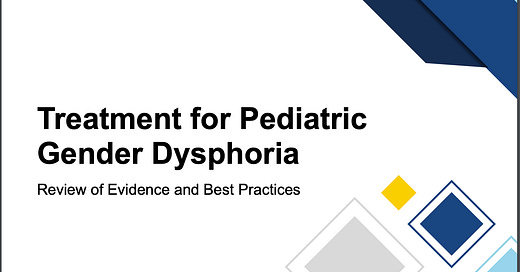U.S. Government Finds ‘Significant Risks,’ ‘Irreversible Harms’ in Medical Interventions for Child Gender Dysphoria
The U.S. Department of Health and Human Services (HHS) has published a “comprehensive review” of “best practices” for the medical treatment of children who express discomfort with their gender.
The review, released Thursday through HHS’ Office of Population Affairs, reveals “serious concerns about medical interventions, such as puberty blockers, cross-sex hormones, and surgeries, that attempt to transition children and adolescents away from their sex,” says the document’s accompanying press statement.
The announcement adds that the review “highlights a growing body of evidence pointing to significant risks—including irreversible harms such as infertility—while finding very weak evidence of benefit.”
“That weakness has been a consistent finding of systematic reviews of evidence around the world,” the federal health agency asserts.
“Our duty is to protect our nation’s children—not expose them to unproven and irreversible medical interventions,” said National Institutes of Health (NIH) Director Dr. Jay Bhattacharya in a statement. “We must follow the gold standard of science, not activist agendas.”
The report’s foreword notes that “thousands of American children and adolescents” have undergone the medical interventions that transgender activists call “gender-affirming care,” among them “social affirmation,” puberty blockers, cross-sex hormones, and “surgeries including mastectomy.”
According to HHS, parents have been told that “pharmacological and surgical interventions as treatments for pediatric gender dysphoria” are “medically necessary” and even “life-saving.”
Former Biden HHS assistant secretary Rachel (born Richard) Levine described gender-affirming care in exactly those terms during a Democrat-hosted “pride month” town hall in June 2022.
In its comprehensive review, the U.S. federal health agency now acknowledges the “growing international concern about pediatric medical transition.”
“Having recognized the experimental nature of these medical interventions and their potential for harm, health authorities in a number of countries have imposed restrictions,” the report notes. “For example, the UK has banned the routine use of puberty blockers as an intervention for pediatric gender dysphoria.”
HHS observes that the World Professional Association for Transgender Health (WPATH) and the Endocrine Society have produced the “most influential clinical guidelines for the treatment of pediatric gender dysphoria.”
“A recent systematic review of international guideline quality did not recommend either guideline for clinical use after determining they ‘lack developmental rigour and transparency,’” the report adds, noting that, in developing its Standards of Care, Version 8 (SOC-8):
… WPATH suppressed systematic reviews its leaders believed would undermine its favored treatment approach. SOC-8 developers also violated conflict of interest management requirements and eliminated nearly all recommended age minimums for medical and surgical interventions in response to political pressures.
HHS describes the U.S. model of “gender-affirming” care, as “a child-led process in which comprehensive mental health assessments are often minimized or omitted, and the patient’s ‘embodiment goals’ serve as the primary guide for treatment decisions.”
“In some of the nation’s leading pediatric gender clinics, assessments are conducted in a single session lasting two hours,” the health agency observes.
“The voices of whistleblowers and detransitioners have played a critical role in drawing public attention to the risks and harms associated with pediatric medical transition,” HHS adds. “Their concerns have been discounted, dismissed, or ignored by prominent advocates and practitioners of pediatric medical transition.”
Additionally, the federal health agency finds “a dearth of research on psychotherapeutic approaches to managing gender dysphoria in children and adolescents,” due partly “to the mischaracterization of such approaches as ‘conversion therapy.’”
“A more robust evidence base supports psychotherapeutic approaches to managing common comorbid mental health conditions,” the report continues. “Psychotherapy is a noninvasive alternative to endocrine and surgical interventions for the treatment of pediatric gender dysphoria. Systematic reviews of evidence have found no evidence of adverse effects of psychotherapy in this context.”
In a press statement, the American College of Pediatricians (ACPeds) described HHS’ comprehensive report as “groundbreaking,” and having confirmed “the lack of evidence supporting the safety and efficacy of transgender interventions in children and adolescents.”
“Today’s report confirms what we have warned since 2011— transgender interventions on minors, including puberty blockers, cross-sex hormones, and surgeries, cause irreversible harm,” said ACPeds President Dr. Michael Artigues.
“These practices defy decades of science on child development,” he added. “Puberty is not a disease— its absence is. Medicine must do no harm. We call on leading medical organizations to promote policies that align with the findings of this report.”





Incredible that we need to have this report and this debate. This is where the soulless "evidence-based medicine" movement has led us. "Studies" are performed on non-consenting children by "investigators" who are ideologically and financially biased, published in similarly biased journals, and cited as "evidence" in favor of procedures that are obviously and inherently unscientific, harmful and unethical.